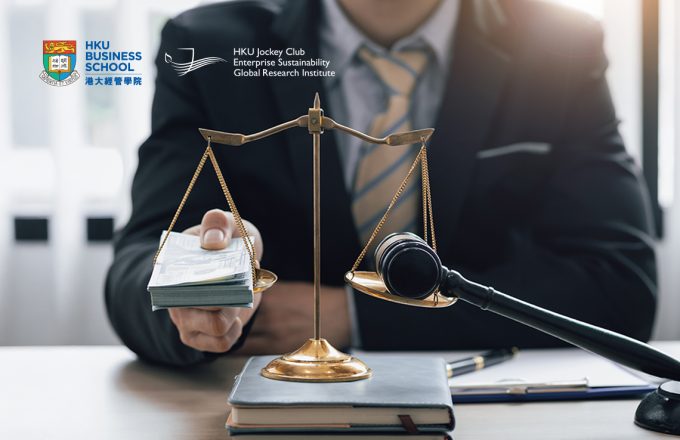
Accounting for Asymmetrical Information

For top managers in conglomerates, gathering information from their divisions that is both complete and accurate is not an easy task, while for capital markets, it’s crucial that the information shared externally is of the highest quality. Five accounting experts found that when internal information asymmetry occurs, the quality of that information suffers.
What happens when a conglomerate lacks full knowledge of what is going on across its internal divisions, and how does that impact the quality of the information that the firm shares externally in its communications with capital markets? That was the crux of a question that five finance and accounting experts set themselves the task of finding out. The results are published in a paper entitled ‘Clarity Begins at Home: Internal Information Asymmetry and External Communication Quality’, published in The Accounting Review in January 2018 and written by Professors Chen CHEN of Monash University, Xiumin MARTIN of Washington University in St Louis, Sugata ROYCHOWDHURY of Boston College, Xin WANG of HKU and Matthew T. BILLETT of Indiana University.
The importance of the question was clear. Firms share many kinds of financial information with capital markets in their quest to increase the firm’s value and to ensure optimum asset allocation. Capital markets rely heavily on the financial statements, earnings announcements and other disclosures provided by a firm to evaluate a firm’s internal operations, strategies, financial performance and overall state of health. In large conglomerate firms, this external communication becomes particularly complex because of the very different types of business that are typically included in the firm’s overall reporting. In a typical conglomerate, divisional managers run each of the separate businesses. They are thus the best informed about their business’s internal working including knowledge about the customer base, competitive advantages, supplier relationships, operations, and opportunities for investment. Division managers report this information from their business to the firm’s CEO and CFO, who are usually responsible for the firm’s overall strategy and performance. In turn, the CEO and CFO sign off on the financial statements and other disclosures that are critical to capital markets’ knowledge and understanding of the firm.
‘IIA arises when top managers possess significantly superior knowledge about their firms relative to divisional managers, or divisional managers possess appropriate information about firm value that top managers lack’, the study’s authors explain.
The reasons for the asymmetry may be manifold. One reason is the nature of the information itself. Soft information may be difficult to communicate in a meaningful way to those at the top of a conglomerate’s hierarchy. Internal competition between divisions for a share of the firm’s resources could encourage managers to distort or withhold information, as could an individual manager’s career ambitions.
The implications of this asymmetry are many. CEOs have been shown to rely on the input provided by division managers for decision-making and internal capital allocation. In large conglomerates with multiple segments, this reliance is even more pronounced.
Lack of access to the full information held by division managers makes it more difficult for top managers to issue accurate earnings forecasts. This can result in less specific forecasts as managers seek to avoid being inaccurate and creating a tendency in managers to lower market expectations on earnings.
Given the importance of the quality of information that a firm shares externally, the study’s mission was to find a way to measure the IIA and then examine its influence on a firm’s external communications. The authors sought to find a method that included not just uncertain information, but the asymmetry in the information held by divisional and corporate managers.
One difficulty the authors faced was how to assess the impact on external communication of information even top managers themselves may not know is lacking. To overcome that challenge, the authors based their research on the reasoning that if managers in a firm have information about their own business divisions that they do not share with others inside the firm, for whatever reason, then the actual returns, or ex post profitability, of their trades in their own firms’ stock will reveal this information.
‘When insider trading profits are higher for the average divisional manger than the average top manager, it is much more likely that top managers lack access to divisional managers’ private information’, they explain.
Along with other data, this trading data was thus keenly scrutinized to find the signed difference in profitability in insider trades between those by divisional managers compared with those of top managers. This difference is called DIFRET, defined as the difference in their respective trading profits on their own company’s stock.
Overall, the implications of the findings are substantial. ‘Our primary results imply that when IIA is high, various aspects of external communication appear to suffer’, says the report. ‘Managers’ voluntary earnings forecasts are less accurate, less specific, more negatively biased, and less frequent. Mandatory financial statements are more subject to error-driven restatements’.
When the level of internal information asymmetry is high, the quality of information shared externally with capital markets is lower. Not only that, but the recognition or suspicion of top managers that they may not be seeing the full picture of the divisions’ business performance can deter them from issuing forecasts at all. When they do issue forecasts, the study shows that they are more likely to avoid details and to dampen earnings expectations for fear of being inaccurate, and it’s a fear that is well placed.
The study resulted in several other observations. For one, physical distance plays an important role in levels of information sharing. Information asymmetry was lower when top managers in headquarters were able to travel more easily to divisional locations. When new flight routes connecting the two were in place, cutting travel time, there were significant declines in DIFRET. This could be because site visits allow top managers to see for themselves how the business is doing, as well as gaining insights into soft information such as employee morale and the peculiarities of local markets. Physical proximity may also encourage division managers to share more information with top managers, as they are more likely to feel that their efforts will be understood and rewarded.
There is no suggestion that division managers should share all the information they hold. In a large conglomerate that would be cumbersome and unnecessary. It is normal and useful in most cases for division managers to hold a great deal of private information that never reaches top management, for example, in businesses that are decentralised and where division managers are responsible for making decisions on key issues such as internal investments.
At the same time, firms should note the implications of what can happen when top managers lack crucial information. As the authors put it, ‘…the quality of decisions taken within a firm is primarily determined by the internal information advantage of the parties in control of those decisions. Thus, when top managers are at an information disadvantage, the quality of external communication suffers’.
Contributing reporter: Liana CAFOLLA
Source: Chen CHEN, Xiumin MARTIN, Sugata ROYCHOWDHURY, Xin WANG, Matthew T. BILLETT (2018). Clarity Begins at Home: Internal Information Asymmetry and External Communication Quality. The Accounting Review 93(1): pp. 77—101.
http://www.aaapubs.org/doi/abs/10.2308/accr-51842?journalCode=accr







